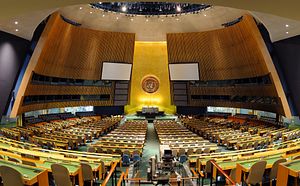Choe Ryong-hae, a close personal aide to North Korea’s leader Kim Jong-un considered in some circles to be the second most powerful person in the country and integral in the purging and execution last month of Kim Kyong-ok, will be sent to Russia as a special envoy according to the official Korean Central News Agency (KCNA). While the report did not indicate when Choe would visit or where exactly he would go, the announcement is auspiciously timed just before the U.N. General Assembly’s vote next week on the EU-Japan sponsored resolution concerning a report this year on human rights violations in the Hermit Kingdom’s notorious political prisons.
Should the GA pass the resolution, North Korea will be looking for assurances from its Security Council patrons: China and Russia. While Pyongyang’s relations with Beijing have been strained as the new leader has purged officials close to China, ties with Moscow are less tenuous. North Korea may also be counting on additional sympathy from Russia in light of its isolation in Europe because of the ongoing crisis in Ukraine. Neither China or Russia have an interest in giving the U.S. and its Western allies an easy victory over North Korea, although China is more constrained as it is also under pressure from the U.S. and others in the region to bring Pyongyang back to the negotiating table.
Fresh off what Japanese Prime Minister Shinzo Abe is certain to consider a diplomatic victory at the Beijing APEC Summit this week, where he finally met with both Chinese President Xi Jinping and South Korean President Park Geun-hye, he has made an even more ambitious proposal. Abe told the press on Thursday that he also wants to hold a trilateral summit, something Park expressed a desire for as well. While maybe not exactly what Abe had in mind, South Korean senior presidential foreign affairs secretary, Ju Chul-ki, told Yonhap News on Friday that a trilateral foreign ministers’ summit in late December is likely, while the foreign ministry’s spokesman Noh Kwang-il said a meeting of leaders was possible, but that “Japan first needs to demonstrate ‘sincere’ efforts to resolve the issue of Korean sex slaves.”
Ahead of a trilateral meeting between the leaders of the U.S., Australia and Japan this weekend (the first since 2007), Abe said on Friday he was “determined to expand trilateral cooperation between the three countries, to realize a peaceful, secure and prosperous future for the Asia-Pacific region.” Officials that spoke with the Wall Street Journal said the meeting “will look at increasing trilateral cooperation exercises, maritime security measures and lowering tensions by working with other regional partners, including involving China more regularly in military exercises,” while the White House Special Assistant and Senior Director for Asian Affairs, Evan Medeiros, said it would “raise up and highlight the important and growing degree of cooperation on diplomatic and security challenges in the region.” While cooperation with China is vaguely mentioned, neither Abe’s nor U.S. officials’ comments are likely to put China at ease, as it sees a persistent U.S. strategy to contain its nascent naval power within China’s costal seas.
Aside from the wave of trilateral sagas, Russia has decided to make its military presence felt during this week’s multilateral events in the Asia-Pacific. On Wednesday, Russian Defense Minister Sergey Shoigu told the press of plans to fly strategic bombers “as part of drills… to maintain (Russia’s) military presence in the western Atlantic and eastern Pacific, as well as the Caribbean and the Gulf of Mexico.” The U.S. State Department did not buy Russia’s explanation for drills, calling it a “potentially destabilizing activity.” However, Shoigu did add that “in many respects, this is connected with the situation in Ukraine… and reinforcement of foreign military presence next to our border.”
Additionally, Russia has parked a fleet of four warships near Australia’s northeast coast just before the G20 summit is scheduled to start in Brisbane this weekend. Moscow has given two explanations for the ships’ appearance: saying it is an exercise to test their range in case they are required to do Antarctic research on climate change, and that they could, “if necessary, provide security for Russian President Vladimir Putin.” While Australia has sent three vessels and an AP-3C Orion to monitor the group, Canberra is downplaying the presence of the Russian fleet. Australian Prime Minister Tony Abbott “shirtfronted” Putin at the APEC summit over Russia’s involvement in the downing of MH17, which held 38 Australians, in what was reportedly a very confrontational manner by diplomatic standards.

































